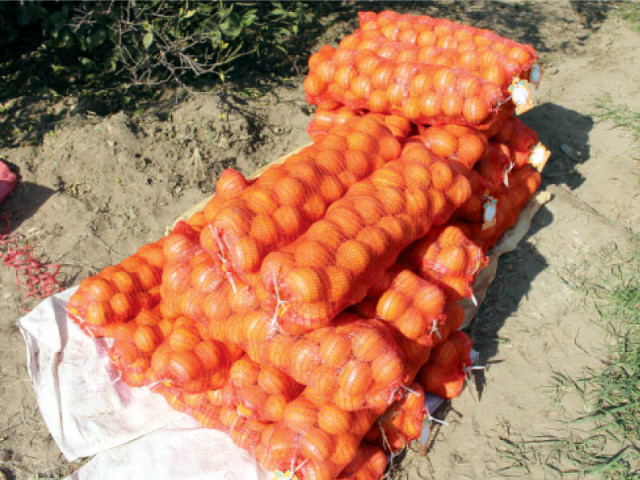Pulp-friction: In Malakand, blood-red oranges are the winter draw
With little to no help from the govt, the fruit still remains a prof itable crop.

Oranges being graded in an orchard in Palai, a town in Malakand district.
PHOTO: FAZAL KHALIQ/EXPRESS
Although the district is widely known for its orange orchards, Palai, a town in the district, has become synonymous with the fame and glory associated with the fruit. Situated in the midst of high mountains, Palai is said to be suitable for the cultivation of the citrus fruit as the soil is rich and well-drained.
Fazal Wahab, a resident of Koza Badara in Malakand who owns an orange orchard, says the fruit has put the region on the map. “The oranges are of a high quality and have attracted both local and international markets,” he says.
“Whenever people visit the area, they take huge crates of oranges back with them for their friends and relatives.”
The crop has generated a sizeable income for Wahab. This year, he sold his orchard’s produce for Rs510,000 to a fruit dealer.
“My orchard has 260 trees and I have managed to earn a great deal of profit over the years,” Wahab says, with pride. “Last year, I sold it [the produce] for Rs480,000.”
Without direction
Agricultural specialists believe there are at least 10 varieties of Palai Malta. However, farmers have faced countless challenges in preserving their popularity in the absence of infrastructure and initiative. More often than not, there is a dearth of equipment and necessary expertise.
Many farmers have repeatedly complained that there are very few experts in the district who can guide them about appropriate strategies to maintain their orchards.
“Whenever our orchards are attacked by pests and other diseases, we have to travel to faraway places to find a cure,” says Wahab. “Recently, our orchards were hit by a new disease and our trees withered away. There is nothing we can do about it.”
According to Wahab, the government must adopt a serious approach to this matter and conduct regular programmes to train and assist farmers in this regard.
Farmers here also lack modern equipment. Some have even complained about the absence of suitable machinery to grade the fruit and have no choice but to manually perform the task.
Time is money
Even though there are countless hurdles to productivity, the fruit has not lost its charm. For their part, workers have taken matters into their own hands and ensure oranges reach the market in a good condition. During harvest season, a large number of farm-hands are seen plucking oranges from trees and grading, packing and transporting them. They know the tricks of the trade like the back of their hands.
“We grade the oranges by sizes—small, medium and large—and then pack them grade-wise,” says Izharuddin, a worker at the orchard. “A bag of 80 oranges of small size is sold for Rs450 whereas a bag of 60 medium-sized oranges is sold for Rs500,” says Izharuddin.”A bag of 50 large oranges is sold for Rs550.”
However, there are various occupational hazards which have to be dealt with. Ismael, another worker on Wahab’s orchard, packs oranges during the three months of the harvest season and earns a daily wage. The remaining months are filled with vague expectation and uncertainty.
“After March, I have to start making trips to Malakand bazaar, which is some 35 kilometres away from the orchard, find work as a labourer,” he explains. It is sometimes very difficult to find work.”
At this juncture, the government is expected to look towards preserving the demand for Palai Malta. Farmers and workers who put everything on the line to bring sweet and refreshing oranges from the country have asked the government for help to make a lucrative crop even more valuable through appropriate use of technology and product awareness.
Published in The Express Tribune, January 31st, 2015.



















COMMENTS
Comments are moderated and generally will be posted if they are on-topic and not abusive.
For more information, please see our Comments FAQ